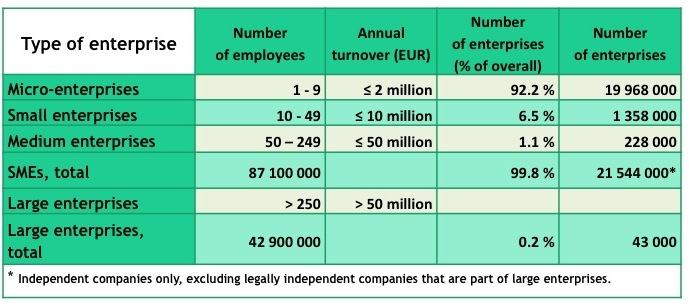
Size of Enterprises in Europe (Moll, R., Being prepared – A bird’s eye view of SMEs and risk management, ISO Focus +, February 2013)
As systems and software quality increasingly
become a subject of concern, and as process approaches are maturing and earning
the confidence of organizations, the use of ISO/IEC JTC1/SC7 international
standards is spreading in organizations of all sizes.
A Very Small Entity (VSE) is an entity (enterprise, organization, department or project) having up to 25 people. However, most standards were not written having in mind Very Small Entities (VSEs) and are consequently difficult to apply in such settings. Worldwide, the percentage of micro and small enterprises is quite high. The table below shows that 92.2% of Eurepoean enterprises have up to 9 employees, another 6.5% have between 10 to 49 employees. Micro enterprises account for 70% to 90% of enterprises in OECD (Organisation for Economic Co-operation and Development) countries and about 57% in USA.

Size of Enterprises in Europe (Moll, R., Being prepared – A bird’s eye view of SMEs and risk management, ISO Focus +, February 2013)
Many Medium and Large enterprises, as illustrated
below, need harware and/or software components produced by VSEs.
Finally, in large organisations, many projects have up to 25 people.
Therefore, VSEs are found at all level of the pyramid below.

There is a wide spectrum of development approaches. The figure below illustrates the positioning of ISO/IEC 29110.
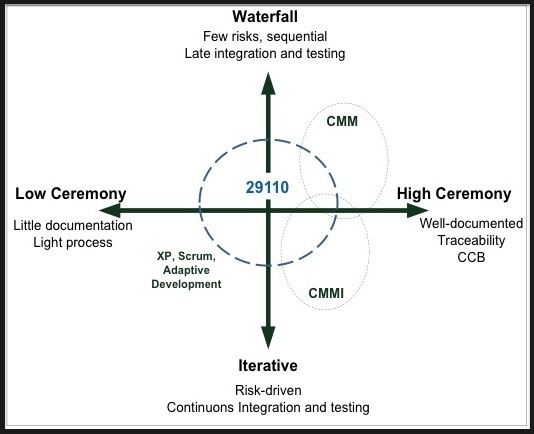
Spectrum of Development Appoaches and ISO/IEC 29110 (adapted from Kroll and Krutchen 2003)
An ISO Working Group, Working Group 24 (WG24),
has been mandated to address the difficulties listed above by
developing standards and guides for VSEs.
In 2011, a first set of documents, titled
ISO/IEC 29110, targeted at VSEs involved in the development or
maintenance of software have been published by ISO.
The ISO/IEC 29110 set of documents, targeted by audience,
will be developed to
improve product and/or service quality, and process performance (see Table 1).
When a new profile is needed, ISO/IEC 29110 Parts 4 and 5 can be developed
without impacting existing documents.
ISO/IEC 29110-6-m provides the specifications
for Specific profiles that are based on subsets of appropriate
standards elements. ISO/IEC TR 29110-7-m-n provides a guide for each
profile of the Specific profile group.
Table 1. ISO/IEC 29110 Target Audience
|
ISO/IEC 29110 |
Title |
Target audience |
|
ISO/IEC 29110-1 |
Overview |
VSEs and their customers, assessors,
standards producers, tool vendors and methodology vendors. |
|
ISO/IEC 29110-2 |
Framework for profile |
Profile producers, tool vendors and
methodology vendors. |
|
ISO/IEC 29110-3 |
Certification and assessment guidance |
VSEs and their customers, assessors,
accreditation bodies. |
|
ISO/IEC 29110-4 |
Generic profile specifications |
VSEs, customers, standards producers,
tool vendors and methodology vendors. |
|
ISO/IEC 29110-5 |
Management, engineering and service
delivery guidelines |
VSEs and their customers. |
|
ISO/IEC 29110-6 |
Specific profile specifications |
VSEs, customers, standards producers,
tool vendors and methodology vendors. |
|
ISO/IEC 29110-7 |
Specific profile guidelines |
VSEs and their customers. |
The figure below presents the complete ISO/IEC 29110 series. Rectangles in light blue indicates a document under development.
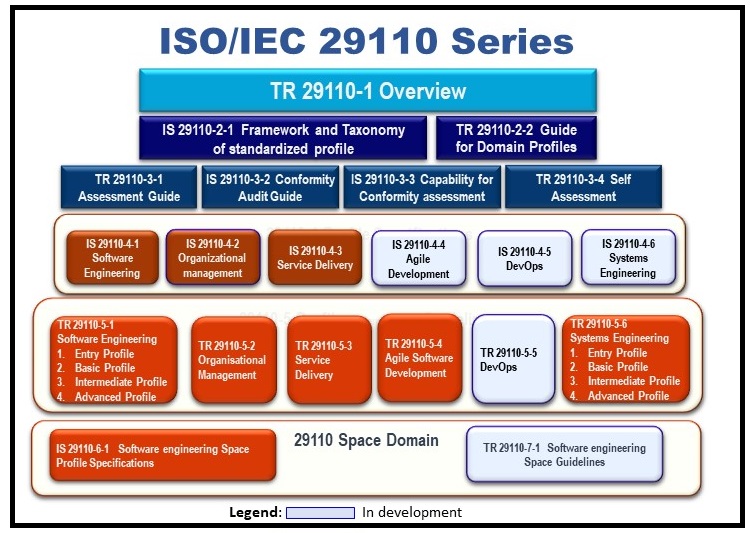
Some ISO/IEC 29110
documents are available in French, English, Portuguese and Spanish (see
below). The figure below illustrates the 2 processes and the activities
of the Software engineering Basic profile.
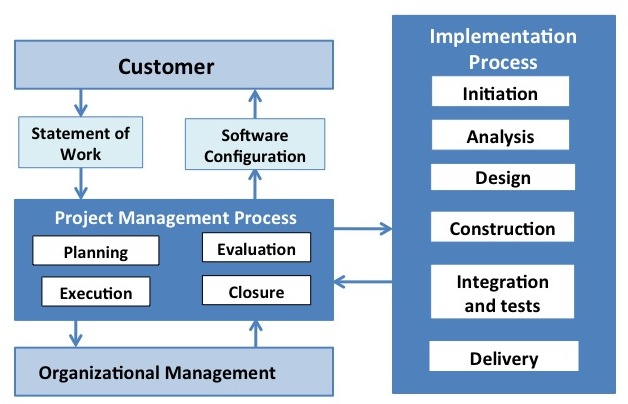
The 2 processes and the activities of the Software engineering Basic profile of ISO/IEC 29110
For illustration purposes, one tasks of the Software Requirements Analysis activity is illustrated below. On the left side of the table are listed the roles involved in a task. The customer (CUS) and the Analyst (AN) are involved in this task. In the second column, we find the description of the task, followed in the third column, with the name of the document required to perform the task (i.e., the Input work product). Finally, in the right column are the titles of the 2 documents produced during the execution of the task (i.e., the Output work products).
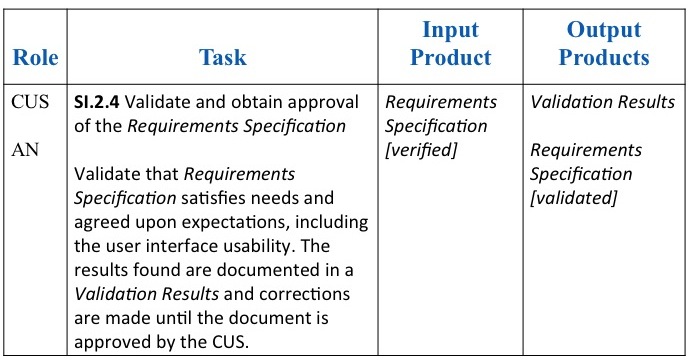
The table below illustrates the proposed content of the Validation Results.
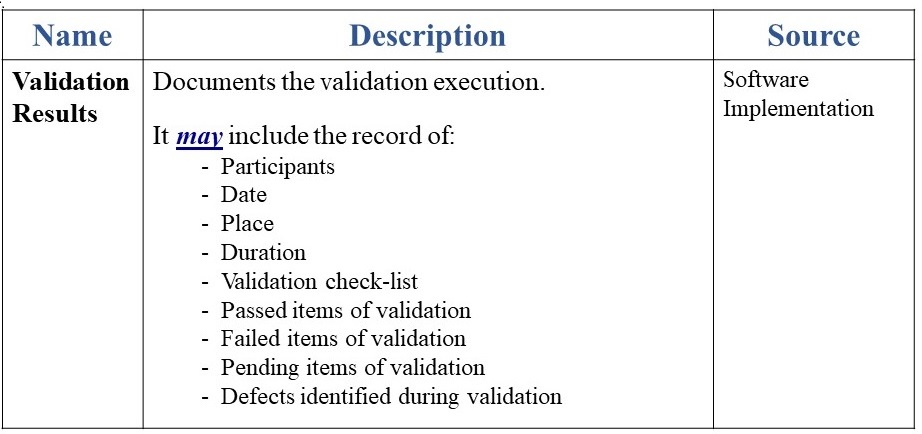
The ISO/IEC 29110 set of standards and guides are not intended to preclude the use of different life cycles such as: waterfall, iterative, incremental, evolutionary or agile.
A VIDEO presents the new ISO/IEC 29110 standard.
------------------------------------------------------------------------------------------------------------------
VSEs Developing or Maintaining Systems
VSEs may develop and/or maintain systems, having hardware and/or software components, that are used in larger systems; therefore, recognition of VSEs as suppliers of high quality systems is often required.
The ISO/IEC 29110 standards and guides for VSEs involved in the development or maintenance of systems are based on subsets of appropriate standards elements, referred to as VSE Profiles. The purpose of a VSE profile is to define a subset of standards relevant to the VSE context, for example, tasks of ISO/IEC/IEEE 15288 and products of ISO/IEC/IEEE 15289.
The systems engineering Basic Profile has been published by ISO in August 2014. The ISO/IEC TR 29110-5-6-2 is available at no cost from ISO at:http://standards.iso.org/ittf/PubliclyAvailableStandards/index.html
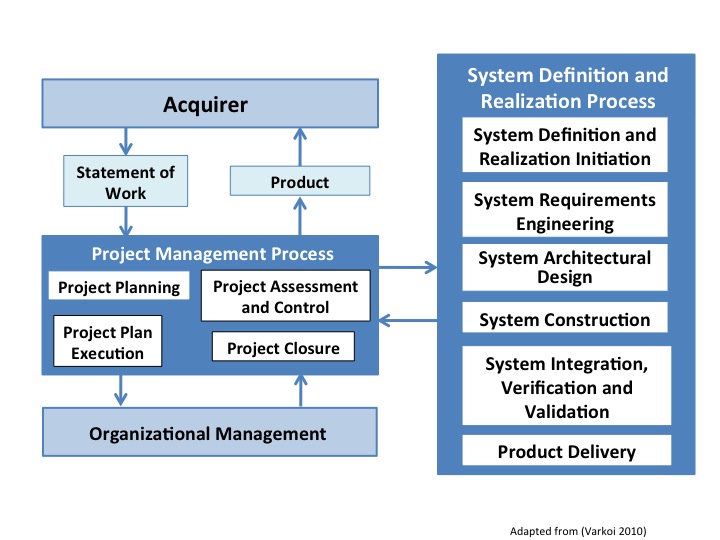
The systems engineering Entry Profile has been published by ISO in November 2015. VSEs Targeted by the Entry Profile are VSEs working on small projects (e.g. at most six person-months effort) and for start-up VSEs.
The ISO/IEC TR 29110-5-6-1 is available at no cost from ISO at: http://standards.iso.org/ittf/PubliclyAvailableStandards/index.html
------------------------------------------------------------------------------------------------------------------
VSEs Developing or Maintaining Software
ISO/IEC 29110 standards and guides are based on
subsets of appropriate standards elements, referred to as VSE Profiles.
The purpose of a VSE profile is to define a subset of ISO/IEC standards
relevant to the VSE context, for example, tasks of ISO/IEC/IEEE 12207
and products of ISO/IEC/IEEE 15289.
ISO/IEC TR 29110-5-1-2 provides an implementation management and engineering guide for the Basic Profile of the Generic Profile Group described in ISO/IEC 29110 Part 4-1. The Basic Profile describes software development of a single application by a single project team with no special risk or situational factors.
The figure below describes the 2 processes of the Software Engineering Basic Profile.
VSEs Targeted by the Entry Profile, ISO/IEC TR 29110-5-1-1, are VSEs working on small projects (e.g. at most six person-months effort) and for start-up VSEs.
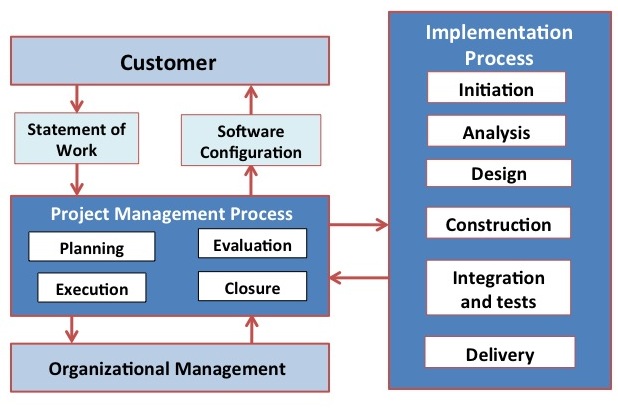
The set
of documents is intended to be used by a VSE to establish processes to implement
any development approach or methodology including, e.g., agile,
evolutionary, incremental, test driven development, etc. based on the
organization or project needs of a VSE.
Overview of the set of documents (see figure below)
ISO/IEC TR 29110-1, defines the business terms common to the VSEs’ Profile Set of Documents. It introduces processes, lifecycle and standardization concepts, and the ISO/IEC 29110 Set of Documents. It also introduces the characteristics and requirements of a VSE, and clarifies the rationale for VSE-specific profiles, documents, standards and guides.
ISO/IEC 29110-2, introduces the concepts for Software Engineering standardized profile for VSEs, and defines the terms common to the VSEs’ Profile Set of Documents. It establishes the logic behind the definition and application of standardized profiles. It specifies the elements common to all standardized profiles (structure, conformance, assessment) and introduces the taxonomy (catalogue) of ISO/IEC 29110 profiles.
ISO/IEC TR 29110-3 defines the process assessment guidelines and compliance requirements needed to meet the purpose of the defined VSEs Profiles. ISO/IEC 29110-3 also contains information that can be useful to developers of assessment methods and assessment tools. ISO/IEC 29110-3 is addressed to people who have direct relation with the assessment process, e.g. the assessor and the sponsor of the assessment, who need guidance on ensuring that the requirements for performing an assessment have been met.
ISO/IEC 29110-4-1 provides the specification for all the profiles of the Generic Profile Group. The Generic Profile Group is applicable to VSEs that do not develop critical software products. The profiles are based on subsets of appropriate standards elements. VSEs’ Profiles apply and are targeted to authors/providers of guides and authors/providers of tools and other support material.
ISO/IEC TR 29110-5-1-2 provides an implementation management and engineering guide for the Basic Profile of the Generic Profile Group described in ISO/IEC 29110 Part 4-1. The Basic Profile describes software development of a single application by a single project team with no special risk or situational factors.
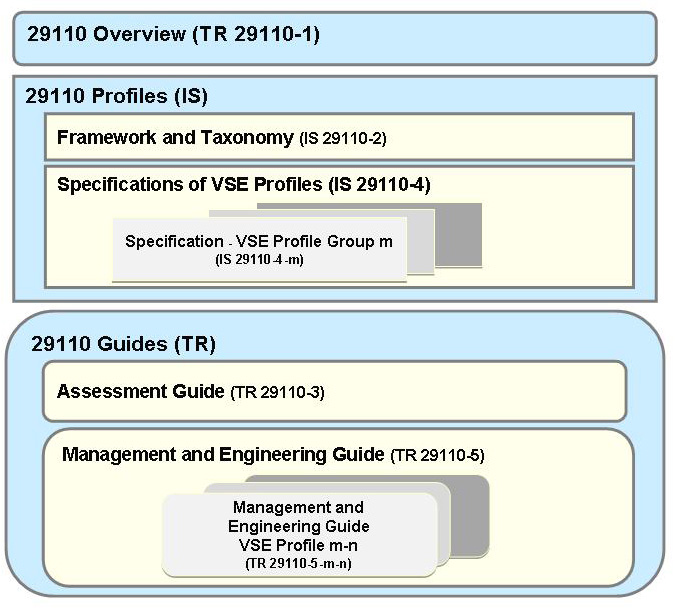
Figure 1. ISO/IEC 29110 Set of Documents (ISO/IEC 29110-5-1-2)
References
Kroll, P., Kruchten, P., 2003. The Rational Unified Process Made Easy: A Practitioner's Guide to the RUP. Addison-Wesley Longman Publishing Co., Inc., Boston, MA, USAISO/IEC TR 29110-1 is available at no cost at: http://standards.iso.org/ittf/PubliclyAvailableStandards/index.html
ISO/IEC 29110-2:2011, Software Engineering - Lifecycle Profiles for Very Small Entities (VSEs) - Part 2: Framework and Taxonomy, Geneva: International Organization for Standardization (ISO), 2011.
Available at: http://www.iso.org/iso/iso_catalogue/catalogue_tc/catalogue_detail.htm?csnumber=51151
ISO/IEC TR 29110-3:2011, Software Engineering - Lifecycle Profiles for Very Small Entities (VSEs) - Part 3: Assessment Guide, Geneva: International Organization for Standardization (ISO), 2010.
ISO/IEC TR 29110-3 is available at no cost at: http://standards.iso.org/ittf/PubliclyAvailableStandards/c051152_ISO_IEC_TR_29110-3_2011.zip
ISO/IEC 29110-4-1:2011, Software Engineering -- Lifecycle Profiles for Very Small Entities (VSEs) - Part 4-1: Specification- VSE Generic Profile Group, Geneva: International Organization for Standardization (ISO), 2011.
Available at: http://www.iso.org/iso/iso_catalogue/catalogue_tc/catalogue_detail.htm?csnumber=51154
ISO/IEC TR 29110-5-1-2: 2011, Software Engineering - Lifecycle Profiles for Very Small Entities (VSEs) - Part 5-1-2: Management and engineering guide - Generic profile group: Basic profile, Geneva: International Organization for Standardization (ISO), 2011.
ISO/IEC TR 29110-5-1-2 (English) is available at no cost at: http://standards.iso.org/ittf/PubliclyAvailableStandards/c051153_ISO_IEC_TR_29110-5-1_2011.zip
ISO/IEC TR 29110-5-1-2 (Spanish) is available at no cost at: http://bvirtual.indecopi.gob.pe/normas/29110-5-1-2.pdf
ISO/IEC TR 29110-5-1-2 (French) is available at no cost at: http://standards.iso.org/ittf/PubliclyAvailableStandards/c051153_ISO_IEC_TR_29110-5-1-2_2011(F).zip
ISO/IEC TR 29110-5-1-2 (Portuguese) is available at: http://www.abntcatalogo.com.br/norma.aspx?ID=90169
[1] ISO/IEC JTC 1/SC7 stands for the International Organization for Standardization/ International Electrotechnical Commission Joint Technical Committee 1/Sub Committee 7

|

|